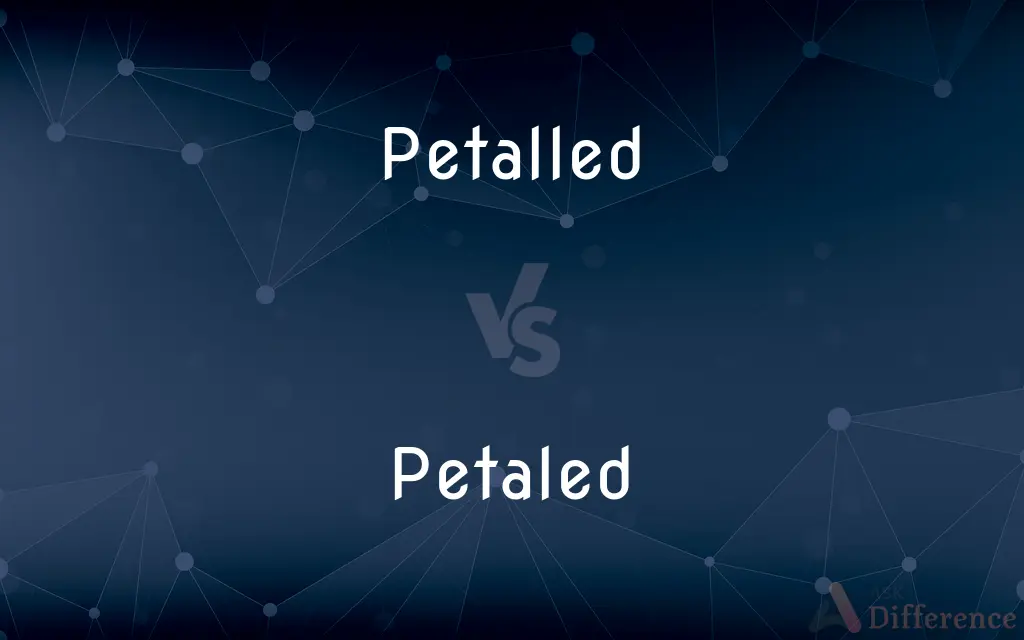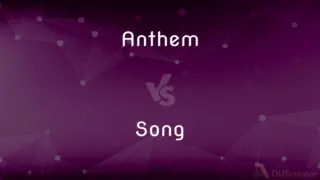Petalled vs. Petaled — What's the Difference?
By Tayyaba Rehman — Updated on October 25, 2023
Petalled and petaled both refer to having petals, with "petaled" being the preferred American spelling and "petalled" more common in British English.

Difference Between Petalled and Petaled
Table of Contents
ADVERTISEMENT
Key Differences
Petalled and petaled are adjectives used to describe something that has petals, usually flowers. Both words function identically in meaning and purpose. Their distinction is primarily geographical, hinging on regional spelling preferences.
Petalled is the form typically employed in British English. When British writers describe a flower with a certain number of petals, or mention the characteristics of those petals, they'll likely use "petalled." On the other hand, petaled is the variant predominantly used in American English, reflecting the general American practice of simplifying certain word endings.
The presence of either "petalled" or "petaled" in text can hint at the origin or the target audience of the content. While both versions are understood internationally, the choice often gives away whether the writer is following American or British conventions. For instance, British gardening books might mention "five-petalled" flowers, while American ones would discuss "five-petaled" blooms.
Despite these regional preferences, it's worth noting that in the age of the internet and global communication, such distinctions are becoming less rigid. There's a growing acceptance for both forms in various parts of the world. Nonetheless, for formal writing, it's advisable to stick with the variant preferred in the given region: petalled for British and petaled for American contexts.
In summary, while petalled and petaled are essentially interchangeable in meaning, their usage is influenced by regional spelling norms, with "petalled" being British and "petaled" being American.
ADVERTISEMENT
Comparison Chart
Definition
Having petals.
Having petals.
Preferred Usage
British English.
American English.
Example
A four-petalled flower.
A four-petaled flower.
Associated with
UK, Commonwealth countries.
US.
Spelling Variant
Double "l".
Single "l".
Compare with Definitions
Petalled
Having petals.
The petalled bloom opened at dawn.
Petaled
Characterized by the presence or number of petals.
A six-petaled tulip is unusual.
Petalled
Describing the form or nature of petals on a plant.
Brightly petalled flowers caught her eye.
Petaled
Describing the form or nature of petals on a plant.
She loved brightly petaled sunflowers.
Petalled
Characterized by the presence or number of petals.
The five-petalled rose was rare in her garden.
Petaled
Having petals.
The petaled beauty was the centerpiece of the bouquet.
Petalled
Having a specific kind or number of petals.
The densely petalled chrysanthemum stood out.
Petaled
Referring to the petals of a flower.
She sketched the uniquely petaled orchid.
Petalled
Referring to the petals of a flower.
The uniquely petalled species was a botanist's dream.
Petaled
Having a particular kind or number of petals.
The densely petaled daisy was her favorite.
Petalled
One of the often brightly colored parts of a flower immediately surrounding the reproductive organs; a division of the corolla.
Petaled
One of the often brightly colored parts of a flower immediately surrounding the reproductive organs; a division of the corolla.
Petalled
(botany) Having petals.
The petalled rim of the sunflower glowed in the morning sunlight.
Petaled
(botany) Having or with petals.
The petaled rim of the sunflower glowed in the morning sunlight.
Petalled
Of flowers; having petals
Petaled
Simple past tense and past participle of petal
Petaled
Having petals; as, a petaled flower; - opposed to apetalous, and much used in compounds; as, one-petaled, three-petaled, etc.
Petaled
Of flowers; having petals
Common Curiosities
Why does Petalled have two "l"s?
It follows British conventions of doubling consonants in certain word endings.
Is one form more correct than the other?
No, the choice between "petalled" and "petaled" is a matter of regional preference.
Is Petaled the same as Petalled?
Yes, both mean "having petals," but petaled is American spelling, while petalled is British.
Are there other words with similar American and British spelling differences?
Yes, like "traveled" (US) vs. "travelled" (UK).
What does Petalled mean?
Petalled describes something as having petals, typically flowers.
Are Petalled and Petaled used in botany?
Yes, both are used to describe flowers based on their petal characteristics.
Can I use Petalled in American writing?
While understood, "petaled" is the preferred American spelling.
In a global context, which form is safer to use?
"Petaled" is more universally recognized due to the global influence of American English, but either should be understood.
Which form is more common globally?
Both are used, with "petalled" more common in British-influenced regions and "petaled" in the US.
Can I use Petaled in British writing?
While it might be understood, "petalled" is the conventional British spelling.
How can I remember which is which?
Think "petaled" with one "l" for America and "petalled" with two "l"s for Britain.
Do both words come from the word "petal"?
Yes, both are derived from "petal" to describe something with petals.
Is there a difference in pronunciation?
Generally, no. Both are pronounced similarly.
In global communication, which form should I use?
Either is understandable, but consider your primary audience or default to American English with "petaled."
Are there other meanings to these words beyond botany?
Their primary use is botanical, describing something as having petals.
Share Your Discovery

Previous Comparison
Anthem vs. Song
Next Comparison
Advisor vs. ConsultantAuthor Spotlight
Written by
Tayyaba RehmanTayyaba Rehman is a distinguished writer, currently serving as a primary contributor to askdifference.com. As a researcher in semantics and etymology, Tayyaba's passion for the complexity of languages and their distinctions has found a perfect home on the platform. Tayyaba delves into the intricacies of language, distinguishing between commonly confused words and phrases, thereby providing clarity for readers worldwide.














































